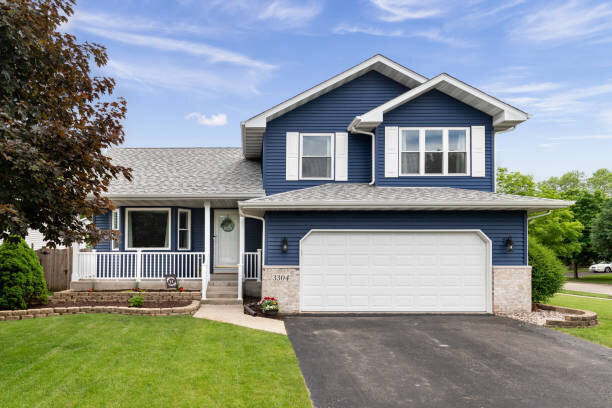
Finding the perfect place to call home is a pivotal life decision. In the Land of 10,000 Lakes, also known as Minnesota, choosing the right house is particularly important due to the diverse climate, unique landscapes, and distinct local communities. If you’re feeling uncertain about your current living situation, here are five signs you might be residing in the wrong house in Minnesota:
1. Seasonal Struggles: Minnesota is known for its dramatic seasonal changes. If you find yourself dreading winter and its freezing temperatures, heavy snowfalls, and icy roads, your house might not be the right fit. The long, cold winters can take a toll on your well-being if you’re not adequately prepared or simply not fond of such conditions.
2. Commuting Chaos: The Twin Cities, Minneapolis and St. Paul, are major hubs of business, culture, and entertainment. If you’re spending a significant portion of your day stuck in traffic or enduring lengthy commutes to reach work, school, or essential amenities, you might want to consider relocating to a more convenient location.
3. Mismatched Lifestyle: Minnesota offers a diverse range of lifestyles, from the urban buzz of the cities to the tranquility of rural areas. If you’re an outdoorsy person and your current house is miles away from hiking trails, lakes, and recreational areas, you might not be living in alignment with your desired lifestyle.
4. Unfitting Community: Each neighborhood in Minnesota has its own unique character and sense of community. If you find it challenging to connect with your neighbors or feel like you don’t belong to the local culture, it might be a sign that you’re living in a place that doesn’t align with your values and social preferences.
5. Financial Strain: Housing costs can vary significantly across the state. If you’re struggling to meet your monthly mortgage or rent payments, it might be a sign that you’re living beyond your means in a house that’s not the right fit for your financial situation. Reevaluating your housing expenses can lead to a more balanced and sustainable lifestyle.
What to Do If You Recognize These Signs:
1. Assess Your Priorities: Start by conducting an honest self-assessment. What are your values, preferences, and priorities? Make a list of the aspects that matter most to you in a living situation, such as proximity to work, access to nature, community engagement, or financial stability. By gaining clarity on what you truly desire, you’ll have a clearer direction for making necessary changes.
2. Explore Other Areas: Minnesota is a diverse state with a range of urban, suburban, and rural areas. Research different neighborhoods and regions that align with your priorities. Look into factors like commuting times, local amenities, outdoor recreational opportunities, and cultural offerings. Visiting potential areas can give you a firsthand feel for their atmosphere and help you envision a better fit.
3. Budget Realignment: If your housing expenses are straining your finances, it’s time to reevaluate your budget. Review your income, expenses, and savings goals. Consider downsizing to a more affordable house or apartment, or explore areas where the cost of living is lower. Creating a balanced budget that ensures financial stability will pave the way for a more comfortable and stress-free lifestyle.
4. Engage with the Community: Feeling disconnected from your community can be disheartening. Take proactive steps to engage with your local area. Attend neighborhood events, workshops, and gatherings. Join clubs or groups centered around your interests. Volunteering for local initiatives not only fosters a sense of belonging but also connects you with like-minded individuals who can make your living experience more enjoyable.
5. Seek Professional Help: Making major housing decisions can be complex, especially if you’re navigating unfamiliar territory. Enlist the help of professionals such as real estate agents and financial advisors. A knowledgeable real estate agent can guide you through the process of finding a more suitable living situation, while a financial advisor can provide insights into budgeting and making financially sound decisions.
6. Consider Long-Term Goals: Think about your long-term goals and how they align with your current living situation. Are you planning to settle down, start a family, or advance in your career? These considerations can influence where you want to live and what type of housing is most appropriate for your future aspirations.
7. Make a Well-Informed Decision: It’s crucial to gather as much information as possible before making any major decisions. Take the time to tour potential houses or apartments, talk to current residents of neighborhoods you’re interested in, and gather data about local schools, healthcare facilities, and transportation options. An informed decision will increase your chances of finding a living situation that suits your needs.
Conclusion
Recognizing the signs that you’re living in the wrong house is a crucial step towards ensuring your happiness and well-being in the vibrant state of Minnesota. From struggling with the state’s extreme weather to feeling disconnected from your desired lifestyle or community, these indicators offer valuable insights into whether your current residence truly suits your needs. If you find yourself resonating with any of these signs, remember that change is possible. Consider reaching out to professionals like Matt Buys Houses MN, who specialize in providing solutions for homeowners facing mismatched living situations. With their expertise, you can explore options that align more closely with your preferences, helping you rediscover the joys of living in Minnesota while enjoying a more harmonious and fulfilling environment. Your ideal Minnesota home is out there, waiting to provide you with comfort, convenience, and the lifestyle you’ve been dreaming of.